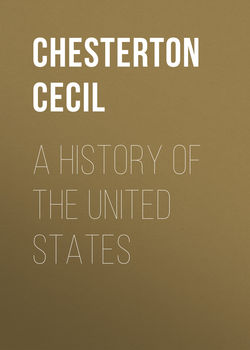Читать книгу A History of the United States - Chesterton Cecil - Страница 5
CHAPTER IV
THE MANTLE OF WASHINGTON
ОглавлениеThe compromises of the Constitution, on whatever grounds they may be criticized, were so far justified that they gained their end. That end was the achievement of union; and union was achieved. This was not done easily nor without opposition. In some cities anti-Constitutional riots took place. Several States refused to ratify. The opposition had the support of the great name of Patrick Henry, who had been the soul of the resistance to the Stamp Act, and who now declared that under the specious name of "Federation" Liberty had been betrayed. The defence was conducted in a publication called The Federalist largely by two men afterwards to be associated with fiercely contending parties, Alexander Hamilton and James Madison. But more persuasive than any arguments that the ablest advocate could use were the iron necessities of the situation. The Union was an accomplished fact. For any State, and especially for a small State – and it was the small States that hesitated most – to refuse to enter it would be so plainly disastrous to its interests that the strongest objections and the most rooted suspicions had eventually to give way. Some States hung back long: some did not ratify the Constitution until its machinery was actually working, until the first President had been chosen and the first Congress had met. But all ratified it at last, and before the end of Washington's first Presidency the complement of Stars and Stripes was made up.
The choice of a President was a foregone conclusion. Everyone knew that Washington was the man whom the hour and the nation demanded. He was chosen without a contest by the Electoral College, and would undoubtedly have been chosen with the same practical unanimity by the people had the choice been theirs. So long as he retained his position he retained along with it the virtually unchallenged pre-eminence which all men acknowledged. There had been cabals against him as a general, and there were signs of a revival of them when his Presidency was clearly foreshadowed. The impulse came mostly from the older and wealthier gentry of his own State – the Lees for example – who tended to look down upon him as a "new man." Towards the end of his political life he was to some extent the object of attack from the opposite quarter; his fame was assailed by the fiercer and less prudent of the Democratic publicists. But, throughout, the great mass of the American people trusted him as their representative man, as those who abused him or conspired against him did so to their own hurt. A less prudent man might easily have worn out his popularity and alienated large sections of opinion, but Washington's characteristic sagacity, which had been displayed so constantly during the war, stood him in as good stead in matters of civil government. He propitiated Nemesis and gave no just provocation to any party to risk its popularity by attacking him. While he was President the mantle of his great fame was ample enough to cover the deep and vital divisions which were appearing even in his own Cabinet, and were soon to convulse the nation in a dispute for the inheritance of his power.
